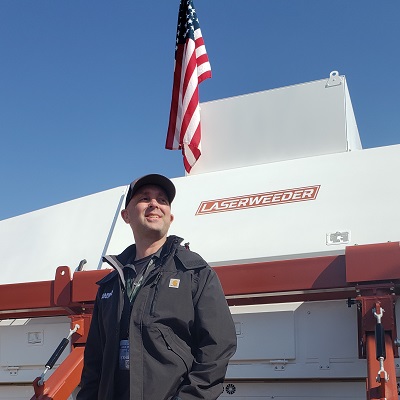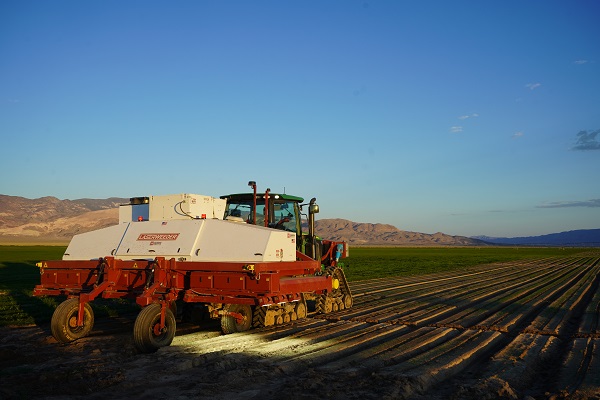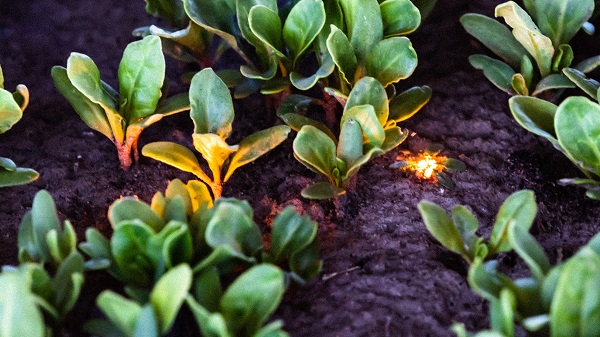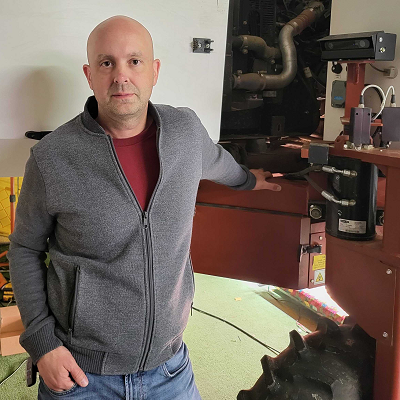Paul Mikesell is founder and CEO of Carbon Robotics, a Seattle-based ag tech company that manufactures a robotic weeding implement called the LaserWeeder. OPN caught up with Paul for a conversation about why he started Carbon Robotics, how the LaserWeeder works, the benefits of using lasers versus blades, his company’s plans for the future, and more.
What is your background, and what led you to found Carbon Robotics?
My background is primarily in engineering. In 2001, I co-founded Isilon Systems, a distributed large-scale storage company. After that company went public in 2006, I co-founded Clustrix, a transaction database startup that was eventually acquired by MariaDB in 2018.

Paul Mikesell, Founder and CEO, Carbon Robotics
Prior to founding Carbon Robotics, I served as the director of infrastructure engineering at Uber. In that role, I focused on deep learning and computer vision, which led me to think about how I could apply this technology to other real-world issues. I have a few friends who are farmers, so I deeply appreciate their hard work and the dedication they have for their profession. I also recognize the importance of their job and how farmers provide food security for the world. After speaking with these friends and other farmers, it became clear that weed control is a major—and accelerating—challenge in agriculture. All of this led me to found Carbon Robotics in 2018, so I could create a weed control solution that helps farmers grow quality food efficiently and sustainably.

Can you describe the Carbon Robotics LaserWeeder and how it works?
The LaserWeeder is a pull-behind implement that seamlessly attaches to the back of tractors, enabling it to integrate effortlessly into existing farm infrastructure. At approximately 20 feet wide, it reaches across three crop rows and features 30 high-power CO2 lasers.

Carbon Robotics LaserWeeder
The LaserWeeder leverages our sophisticated laserweeding technology, driven by AI deep learning models and computer vision software, to efficiently identify, target, and eliminate weeds by zapping them at the meristem. The implement can cover up to 2 acres per hour and shoot up to 200,000 weeds in that time (depending on weed density, weed size, soil conditions, and other factors specific to each farm). The LaserWeeder also features a patented lighting system that allows it to be operable at whatever hour of the day the farmer needs.
“The LaserWeeder is a pull-behind implement that seamlessly attaches to the back of tractors, enabling it to integrate effortlessly into existing farm infrastructure.” - Paul Mikesell
Why did you decide to create a robotic weeder that uses lasers rather than blades?
Unlike blades, our CO2 thermal-powered lasers destroy the stem cells of the weed (not just the top) without disturbing the soil or damaging the weed barrier (in some instances, just small punctures to the weed barrier provide weeds with an opportunity to grow).

Weed shot by LaserWeeder with millimeter accuracy
Cultivation (via blades) also spins up bacteria that is present in the soil, which can land on leafy greens and destroy the crop as well as disturb the delicate balance of the soil’s microbiome.
Additionally, blades can damage crops, especially those that are densely planted. However, our LaserWeeder can target weeds with millimeter precision, even locating and eliminating weeds between crops in the same row.
“Unlike blades, our CO2 thermal-powered lasers destroy the stem cells of the weed (not just the top) without disturbing the soil or damaging the weed barrier.” - Paul Mikesell
What kinds of produce crops can the LaserWeeder be used on?
The LaserWeeder has proven to be effective on a number of large-scale specialty crops, including spinach, baby leaf, carrots, onions, lettuces, arugula, herbs (cilantro, mint, basil, etc.), broccoli, cauliflower, kale, chard, and celery. We expect this list to continue to expand as our team is frequently testing and adding new crop models based on customer demand.
14 days after LaserWeeding (left) versus 14 days after no LaserWeeding (right)
Can you describe your customer base?
As the manufacturer of the only commercially available laserweeding robot, we have customers that you would recognize in all the major US growing regions. Laserweeding is a certified organic weeding method, and most of our growers are using our LaserWeeders for organic crops.
“Laserweeding is a certified organic weeding method, and most of our growers are using our LaserWeeders for organic crops.” - Paul Mikesell
What kind of feedback have you received from customers about the LaserWeeder?
The main feedback we are hearing from customers is that the LaserWeeder’s design integrates seamlessly into farming operations and expedites tedious weed management, both of which are primary goals for us. Additionally, we’ve heard the LaserWeeder provides significant cost savings, with some farmers predicting savings of up to 80 percent.

Paul Mikesell, Founder and CEO, Carbon Robotics
As an example of feedback from a specific grower customer, I can share this recent quote from Jeff Morrison, Grimmway Farms’ director of innovation and new technology: "Grimmway Farms is dedicated to protecting natural resources and the environment while optimizing crop yield and soil health. We are constantly improving our processes and evaluating new equipment to support our commitment to this mission. When we learned of Carbon Robotics’ laserweeding technology, we were eager to deploy it on our farms. This revolutionary approach to weeding delivers precision, reliability, and cost-effectiveness in organic weeding that has not previously been available, making it an ideal solution to weed management."
What are your company’s plans for the future?
We recently secured $27 million in Series B funding to continue to grow our organization, increase manufacturing capacity, and service new agricultural and geographic markets. A main priority for us is to expand our world-class engineering team, so we can continue to create and manufacture industry-leading weeding solutions for farmers. All of our products are proudly made in the US.
“When we learned of Carbon Robotics’ laserweeding technology, we were eager to deploy it on our farms. This revolutionary approach to weeding delivers precision, reliability, and cost-effectiveness in organic weeding that has not previously been available, making it an ideal solution to weed management." - Jeff Morrison
Do you see robotic weeders playing an increasing role in the organic produce industry in the years to come?
It’s no secret that there is a growing interest among consumers in organic products. Based on this demand as well as profitability (organic produce has a 30 percent higher selling price on average than conventional produce), more farmers are starting to transition to organic. However, the largest obstacle to increasing organic food production is cost-effective weed control, which has caused the transition to organic farming to slow as farmers struggle to achieve efficient weed management. I believe robotic weeders, especially LaserWeeders, will become increasingly popular in the organic produce industry because these implements offer a reliable, efficient, and cost-effective weeding method that supports organic farming.






